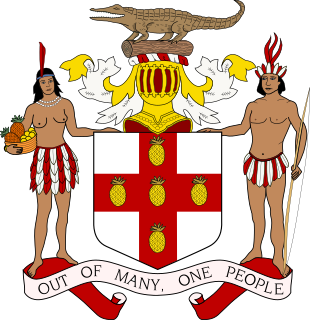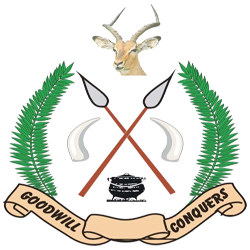
The politics of Zimbabwe takes place in a framework of a full presidential republic, whereby the President is the head of state and government as organized by the 2013 Constitution. Executive power is exercised by the government. Legislative power is vested in both the government and parliament. The status of Zimbabwean politics has been thrown into question by a 2017 coup.

Limpopo is the northernmost province of South Africa. It is named after the Limpopo River, which forms the province's western and northern borders. The name "Limpopo" has its etymological origin in the Ndebele language, the original inhabitants of the area, meaning "strong gushing waterfalls". The capital is Polokwane,.

The Judiciary Act of 1789 was a United States federal statute adopted on September 24, 1789, in the first session of the First United States Congress. It established the federal judiciary of the United States. Article III, Section 1 of the Constitution prescribed that the "judicial power of the United States, shall be vested in one Supreme Court, and such inferior Courts" as Congress saw fit to establish. It made no provision for the composition or procedures of any of the courts, leaving this to Congress to decide.

The Constitutional Court of South Africa is a supreme constitutional court established by the Constitution of South Africa. It was originally the final appellate court for constitutional matters. Since the enactment of the Superior Courts Act in 2013, the Constitutional Court has jurisdiction to hear any matter if it is in the interests of justice for it to do so.

The High Court of South Africa is a superior court of law in South Africa. At present it is divided into seven provincial divisions, some of which sit in more than one location. Two further divisions are in the process of being established. Each High Court division has general jurisdiction over a defined geographical area in which it is situated, and the decisions of a division are binding on magistrates' courts within its area of jurisdiction. The High Court has jurisdiction over all matters, but it usually only hears civil matters involving more than 400,000 rand, and serious criminal cases. It also hears any appeals or reviews from magistrates' courts and other lower courts.
The Superior Court of Justice is a superior court in Ontario. The Court sits in 52 locations across the province, including 17 Family Court locations, and consists of over 300 federally appointed judges.
The High Court of Ireland is a court which deals at first instance with the most serious and important civil and criminal cases. When sitting as a criminal court it is called the Central Criminal Court and sits with judge and jury. It also acts as a court of appeal for civil cases in the Circuit Court. It also has the power to determine whether or not a law is constitutional, and of judicial review over acts of the government and other public bodies.

The Western Cape Division of the High Court of South Africa is a superior court of law with general jurisdiction over the Western Cape province of South Africa. The division, which sits at Cape Town, consists of 31 judges led by Judge President John Hlophe.
The Eastern Cape Division of the High Court of South Africa is a superior court of law with general jurisdiction over the Eastern Cape province of South Africa. The main seat of the division is at Makhanda, with subordinate local seats at Port Elizabeth, East London, Bhisho and Mthatha. As of November 2017 the Judge President of the division is Selby Mbenenge.

The KwaZulu-Natal Division of the High Court of South Africa is a superior court of law with general jurisdiction over the KwaZulu-Natal province of South Africa. The main seat of the division is at Pietermaritzburg, while a subordinate local seat at Durban has concurrent jurisdiction over the coastal region of the province. As of August 2013 the Judge President of the division is Chiman Patel.
The Limpopo Division of the High Court of South Africa is a superior court of law with general jurisdiction over the Limpopo province of South Africa. The main seat of the court in Polokwane opened on 25 January 2016. The court also has local seats at Thohoyandou and Lephalale. Before the opening of the division, the Gauteng Division at Pretoria had jurisdiction over Limpopo and circuit courts sat at Polokwane.

The judiciary of Jamaica is based on the judiciary of the United Kingdom. The courts are organized at four levels, with additional provision for appeal to the Judicial Committee of the Privy Council in London. The Court of Appeal is the highest appellate court. The Supreme Court has unlimited jurisdiction in all cases, and sits as the Circuit Court to try criminal cases. The Parish Court in each parish hears both criminal and civil cases, excluding grave offences. The Petty Sessions are held under Justices of the Peace, with power to hear minor crimes.

Bushbuckridge Local Municipality is a third-level administrative division in the Ehlanzeni District of Mpumalanga in South Africa. Commercial farming, which consists of pine /bluegum plantations, Tobacco, cotton, sub-tropical fruits and vegetables are farmed in the municipality's countryside. The municipality includes part of Kruger National Park. Bushbuckridge is the largest local municipality in Mpumalanga, both in terms of land and by population size.

The Judicial Service Commission is a body specially constituted by the South African Constitution to recommend persons for appointment to the judiciary of South Africa.

The nine provinces of South Africa are governed by provincial governments which form the second layer of government, between the national government and the municipalities. The provincial governments are established, and their structure defined, by Chapter Six of the Constitution of South Africa.
The Seventeenth Amendment of the Constitution of South Africa made a number of changes to the structure of the South African judiciary. The bill for the amendment was passed by the National Assembly on 20 November 2012 with the required two-thirds majority; because it is a constitutional amendment not affecting the provinces it was not required to be voted on by the National Council of Provinces. The act was signed by President Jacob Zuma on 1 February 2013, and a presidential proclamation brought it into force on 23 August 2013. The amendment came into force simultaneously with the Superior Courts Act, 2013, which implemented a major rationalisation and restructuring of the judicial system.

The Gauteng Division of the High Court of South Africa is a superior court of law which has general jurisdiction over the South African province of Gauteng and the eastern part of North West province. The main seat of the division is at Pretoria, while a local seat at Johannesburg has concurrent jurisdiction over the southern parts of Gauteng. Dunstan Mlambo has been the Judge President of the division since 1 November 2012.
The Mpumalanga Division of the High Court of South Africa is a superior court of law with general jurisdiction over the Mpumalanga province of South Africa. The main seat of the court in Mbombela (Nelspruit) opened on 13 May 2019. The court also has a local seat at Middelburg. Before the opening of the division, the Gauteng Division at Pretoria had jurisdiction over Mpumalanga and circuit courts of that division sat at Mbombela and Middelburg.


















